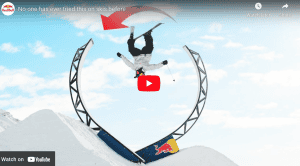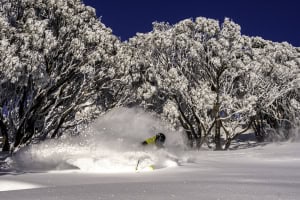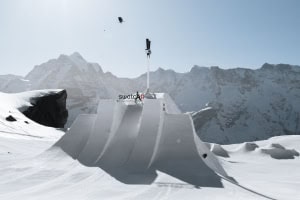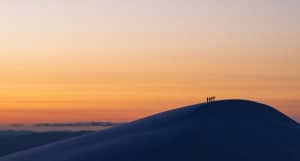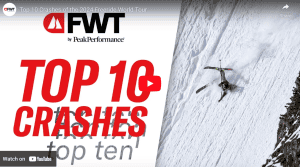Travel – On Safari With Pow Jesus
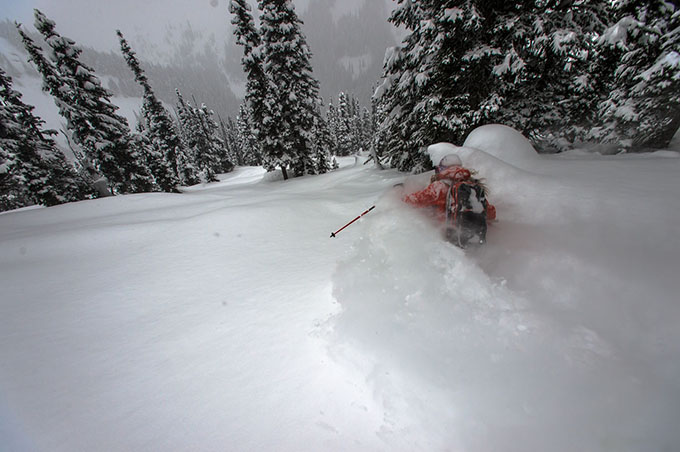
Floating, levitating, moving. A visceral experience.
Chillfactor | Chris Booth
All Photos by Reuben Krabbe
“Me and a couple of buddies, we had a syndicate for years. Then in 2008 we won $34.1 million dollars.” I’m sitting at the Bitter Creek café in Stewart, a small Canadian town on the Alaskan Frontier. Sitting across from me is Mike, a semi-bald, heavy-set guy from Kelowna. Wearing an old BC Hydro jacket, he kind of looks like a logger. Mike finishes his beer, looks at it, then looks at me and says, “When I found out I tried calling my parents to tell them, but I couldn’t get through. So I put on a Chuck Berry record and danced around my house in my underwear.” He orders another pint of Honey Brown, “I didn’t blow it all though like most people. I still have my share, I still work, I still have the same house and everything, but now I can afford to go heli skiing every year.”
Mike is not the kind of guy I expected to meet at a heli ski operation. But then again, none of this is what I expected. When I was given the chance to go on a Heli Safari with Last Frontier Heli, located up in the far reaches of northern BC, Canada, I had figured it would be the classic Canadian heli/lodge experience, the experience the Canadian reputation is built on. But from the moment I arrived in Stewart – the first stop on our Safari – I had to rethink all of it.

Stewart is a town built to support a mining industry that no longer exists. Situated at the end of the Portland Canal, Stewart sits about a half mile from the border. A clear-cut through the forest separates it from neighbouring Hyder, Alaska, population 87.
The wheels of industry turned here for almost 100 years. There was a time when the town swelled to many tens of thousands and business was good, a time when men from all over Canada flocked to work the silver mines, drink whisky and make more of themselves. But the landscape was harsh and unyielding. Giant glacial plateaus plunged into icy ocean fjords. Avalanches engulfed teams of men working the valleys below. Man they must have tried. They carved tunnels through rock, they shored up massive slipping hillsides, they cut trails through deep pine and hemlock forests, and they laid tracks along the shorefront to set up a goods line down south. But this was rough country, nobody got rich, and when the mines closed down and moved to more profitable locations, the workers left with them.
Today the town is all but dead. But the spirit of frontier life remains in the buildings that continue to line Main Street. Some are artfully restored in Pastel timber, like the Ripley Creek Inn and the Bitter Creek Café, with their cosy kitsch interiors and bric-a-brac from the silver rush, others less so. Down the road an original ‘57 Chevrolet Bel Air in jet blue sits in an old warehouse. It looks like it’s been driven once and then just left to sit.
But where most would see only history, two salty old Swiss skiers and an Englishman saw something else. Like the miners of the early 20th century, George Rossett, Franz Fux and Mike Watling saw opportunity where others saw nothing but wilderness. For the miners it was the rich silver veins in the upper Salmon River Basin, for Rossett, Fux and Watling, it was the 9,500km2 of available tenure, packed with expansive glaciers, steep fall-line forests and epically skiable peaks, making it the biggest single heli ski operation on earth. In the middle of this skiing Nirvana, Last Frontier Heli was born.
My arrival coincided with an Arctic Outflow causing sub-arctic temperatures starting at minus 25 degrees. Tundra-like conditions made the first two days unbearable. It was cold, it was dry, and it was hard. But then it snowed. After being sucked into the slipstream of the Outflow, this low pressure dropped 50cms of the driest snow imaginable in a single night, lighter than Utah, lighter than Hokkaido, lighter than anything. I’ve never seen anything like it. I figured being a heli operation we couldn’t fly during a storm system, and that we would have to wait for the next blue bird to go up, but that very next morning we were out there in the field. What we saw was a landscape transformed; from an empty frostbitten Yukon to a deep winter wilderness. Pow.
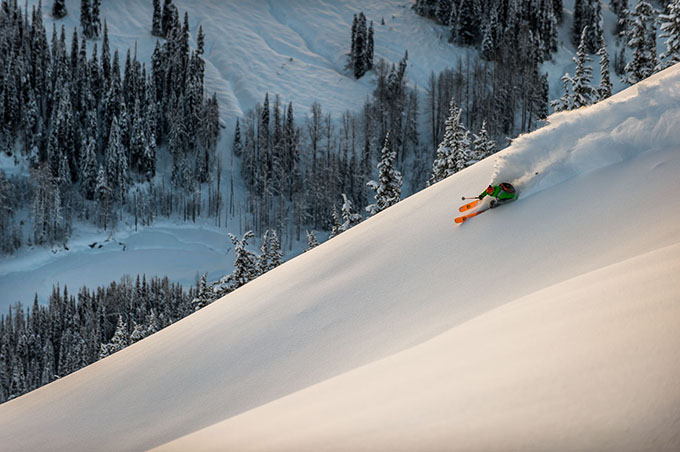
Up this far north you’re a long way from anywhere. They don’t seem to mind, though.
We couldn’t believe it. None of us, not even Watling himself had ever skied snow like that. It was all there in front of you, but there just wasn’t any resistance, there was no feedback, you couldn’t feel a single flake. It was so deep and yet so fast that even making simple turns through it was strange; less like skiing and more like moving through a medium, like being a ghost.
“Having good tree line skiing is so important for a heli operation,” said Watling as we waited to drop the next run, “otherwise you just don’t get to ski days like this.” I wasn’t at all accustomed to flying around in a helicopter in the middle of a storm system, but at Last Frontier you average four out of five days on the hill. That’s an unbelievable strike-rate for a heli ski operation.
With each lap it seemed we would ski into snow that was even drier and even deeper than the last. At one point we skied the left side of a long bending bowl. I watched as the others dropped into the bowl and disappeared somewhere into the tree line, long-veiled ghosts leaving monochrome vapor trails lingering in the frigid white air before me. I filled my lungs with cold air, and dropped.
The next part was something I’d never experienced before. All you could really do was just point your skis fall line and let the snow – now up to your chest just below armpit level – engulf you completely. It was like being at the eye of your own personal snowstorm, catching only momentary glimpses of the run before the next turn washed over you. And with snow so light it got in everywhere; in the seams of your hood, in between your goggle lenses, through the powder skirt in your jacket and up your back and up and inside your beanie – while you were wearing it. It was just unbelievable.
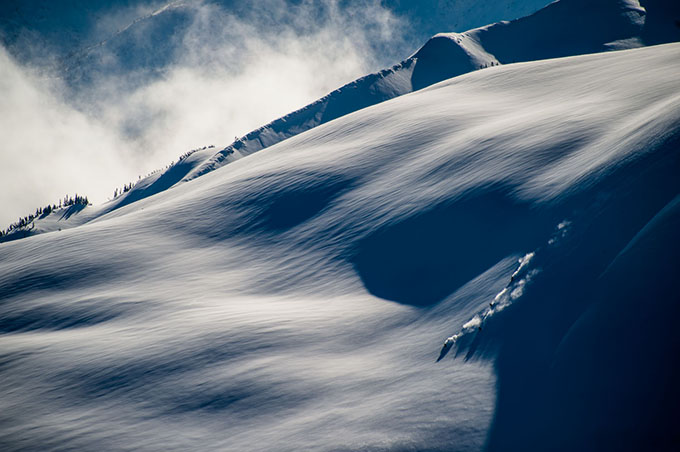
Long, open expanses of pow. Gladed steeps. Knife-edge spines. Last Frontier has it all.
“You think you have something to write about yet?” said Watling as he handed me a sandwich and a cup of coffee back at the helicopter. I sort of nodded and smiled. I wasn’t settled and didn’t really have anything to say. I had only just stopped and the magic of the universe was only just starting to gel in my veins. Part of me was still up in that bowl somewhere; eyes closed levitating two feet from the ground. I took the sandwich into my hands and saw that it was squishy and real. I spilled some coffee onto my gloves, pulling me back into the present. “You ready for Bell 2 now? It’s completely different all over again, you’ll see,” Watling said as we piled the backpacks into the ski box. “The weather’s really coming in so it’s time to move.” And so it went, feeling like I had only just returned to Earth, now it was time to leave again.
We’re flying at treetop elevation and the windows are thick with condensation. It’s minus 22 degrees outside and dumping. Visibility is low. Through the front window I watch as the Alaska Highway files out ahead, trucks carrying natural gas and logs pass underneath. It’s our map from Ripley Creek to Bell 2 Lodge. “We go by the IFR principle here,” yelled Mike over the drum of the heli, “I Follow Roads.” Roads (and rivers) are the lifelines when the weather gets bad in the area; they are what the pilots use to stay oriented when the clouds really come in.
We soon land at Bell 2 Lodge, located 360km Northwest of Smithers and deep into the Canadian Wilderness. Originally a service station for travellers of the Stewart-Cassiar Highway on their way to the Alaska and the Yukon, Bell 2 Lodge is now the beating heart of Last Frontier’s Drop City – a smattering of log chalets surrounding the main lodge. While I spent the day skiing, the crew at Last Frontier were busy transporting my luggage from Stewart to Bell 2, and were already packed away in my cabin by the time we landed.

Bell 2 is remote but with satellite communication and state-of-the-art environmental facilities, it offers the comforts of a first-class hotel with a rustic touch of the Canadian wild. The dining room, lounge and bar act as the focal point for skiing stories to be shared, while the hot tub, massage rooms and yoga studio offer all those other modern comforts one would expect from a fancy hotel.
But it’s no hotel. It’s much more personal than that. Because Last Frontier is foremost about skiing, the lodge looks like it’s been tinkered on over time. There is no overall design scheme, it’s not like a designer rolled out a floor plan and went, “let’s build a customer experience.” Each room in the lodge is different. When you walk in through the entrance the first thing you see as a sign that reads, what would Johnny Cash do? I’m not sure what it means, but I like it. Bell 2 has something distinctly personal about it, perhaps a materialisation of who Watling is as a person. “This has been my life, this place,” he says. “I’ve put everything into it.”
The next day there isn’t a cloud in the sky. The early sun shines bright, blocked only by crisp white peaks casting soft morning shadows across the valleys. As the helicopter lifts off from our first drop it whirs cold snow into a cloud above us, glittering in the morning sun. We are feeling humble after yesterday, and today the mood is pure gratitude. This is a harsh and unrelenting part of the world, but today the mountains are kind. We ski bluebird pow till dusk, stopping only to collect a chunk of glacier ice for the bar – it’s Watling’s thing. “It’s dense so it lasts incredibly long in the glass,” he says with a grin as he shoves it into the rear hatch. I guess he who owns the place can do what he wants.
But before we head back, Watling has one last run he wants to show us.
“This isn’t a place we usually take guests,” he says, “but it’s the coolest area I’ve seen around this whole place.” We land atop a long, steep ridge where the alpine meets the treeline. The early evening light catches it beautifully, casting everything in a pinkish alpenglow. “I’d usually let the guide and guests drop first, but it’s my birthday today,” says Watling as he pushes off, quickly disappearing over the rollover. I crank my boots then take a brief moment to look around. What a place.
I make a few turns into the rollover but can’t see much below, it seemed to keep rolling. So I went a little further and tracked right around an island of trees. And then it revealed itself – the full enjoy, a 2000ft apron of pow that ran steep down off the ridge all the way to the heli below, bathed in the last light of the day. I thought, “You know what, I’m just going to let go here”. This is the moment you spend all year working for, the moment you picture in your head at 3pm on a Wednesday when you’re wondering why you are in an office surrounded by grey plastic electronics responding to emails. This is the reason you get up everyday and wade through the abrasiveness of life and all its vicissitudes; the monotony, the subservience, the inescapability of gravity and the whole stupid, ridiculous everything. This is the moment you keep in your head to help you through that. Now that I was finally there I threw myself into that moment completely. I put everything on autopilot. I could feel my skis turning and moving, but relinquished all control over them. I stopped bothering with pole plants and let my arms go wherever. Snow was flying up everywhere around me, terrain was coming at me quickly, trees were flying by, but in the middle of it was calm. I started to breathe. I was in a meditative state, allowing every movement to occur naturally, to respond to what the mountain gave me, but without a single thought as to its existence. And in that moment, that moment just there, I began to discover paradise.
I was on a one-man party-wave of emotion, ghosting through magical frozen ether on my orange hover planks. With arms stretched out, I pointed straight down the mountain and, lifting my head to the sky, I thanked the universe. I had entered a transformational vortex into a visceral infinity. I had become Pow Jesus.
Later in the Base 2 Lodge bar the mood is lifted. The guests are at the tail-end of their week and making the most of it; too early to think of the real world that awaits them, and still tucked far enough away from the world to pretend that it doesn’t exist, they toast to a week without compromise. I’m still in my ski boots. My feet are wet but I don’t care. I toast the week with them. Watling comes over and pours me another glass of Forty Mile. “You think you have something to write about yet?” he says again. Watling and I cheers glasses. There’s an Aussie chick behind the bar. She’s from Myrtleford and plays Mandolin. When she later pulls it out and starts playing everyone stops what they’re doing and watches. She’s impressive. One of the guides picks up a guitar and plays along. Watling pours me another glass of Forty Mile. I notice that the glacier ice in my glass hasn’t melted. “So what’s the deal with this place?” I ask. “Why would you come here to heli ski instead of other places?” He takes a sip and gestures closer to me, “Stuff the heli skiing,” he says, “You know what it’s about? It’s about F-U-N. That’s what we do.”
I finish my drink and gesture my thanks to Watling across the bar. He’s over pouring someone else a drink and entertaining some guests and doesn’t see me. I let it go. On the way out I pass the Johnny Cash sign at the entrance. I stop there for a moment. “What Would Johnny Cash do?” it reads. Now I think I understand.
Thanks: Boothy’s awesome week was courtesy of Last Frontier Heliskiing. For info go to http://www.lastfrontierheli.com/


